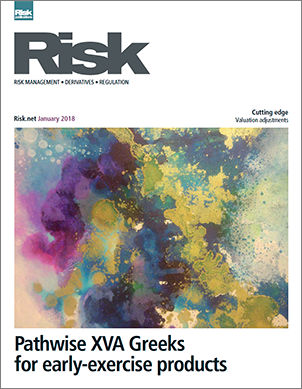
Risk Magazine Cutting Edge Research Article | Pathwise XVA Greeks for Early-Exercise Products
Price sensitivities to risk factors, otherwise known as Greeks, have recently been just as challenging to calculate as they are essential in efficient risk management and regulatory reporting. This is especially true in the case of derivatives with early exercise features, such as Bermudan options, where exercise is allowed at certain specified dates before expiration.
It becomes even more complicated and time-consuming when one has to price valuation adjustments (XVAs) for these instruments, as this involves computation of the future values of the derivative at each exercise point.
Distributions of future values are computed using Monte Carlo simulations and regression. Finding Greeks, on the other hand, requires differentiation of these regressions at each future value, which can be computationally very intensive.
In this Cutting Edge research article published in the January 2018 Issue of Risk Magazine, Drs. Alexander Antonov, Serguei Issakov, Michael Konikov, Andy McClelland, and Serguei Mechkov maintain that differentiation of regressions can be avoided for some derivatives instruments and highlights how avoiding differentiation has two advantages – speed and accuracy. Using a new Numerix technique, Greeks can be computed almost as quickly as the time it takes to price the derivatives. Cutting the step of differentiating regressions also helps reduce noise in the estimation.
Authors: Drs. Alexander Antonov, Serguei Issakov, Michael Konikov, Andy McClelland, Serguei Mechkov
Price sensitivities to risk factors, otherwise known as Greeks, have recently been just as challenging to calculate as they are essential in efficient risk management and regulatory reporting. This is especially true in the case of derivatives with early exercise features, such as Bermudan options, where exercise is allowed at certain specified dates before expiration.
It becomes even more complicated and time-consuming when one has to price valuation adjustments (XVAs) for these instruments, as this involves computation of the future values of the derivative at each exercise point.
Distributions of future values are computed using Monte Carlo simulations and regression. Finding Greeks, on the other hand, requires differentiation of these regressions at each future value, which can be computationally very intensive.
In this Cutting Edge research article published in the January 2018 Issue of Risk Magazine, Drs. Alexander Antonov, Serguei Issakov, Michael Konikov, Andy McClelland, and Serguei Mechkov maintain that differentiation of regressions can be avoided for some derivatives instruments and highlights how avoiding differentiation has two advantages – speed and accuracy. Using a new Numerix technique, Greeks can be computed almost as quickly as the time it takes to price the derivatives. Cutting the step of differentiating regressions also helps reduce noise in the estimation.
Authors: Drs. Alexander Antonov, Serguei Issakov, Michael Konikov, Andy McClelland, Serguei Mechkov
Authors

Serguei Issakov, Ph.D.
Dr. Issakov, as Chief Quantitative Officer and Senior Vice President of Global Quantitative Research and Development, oversees the company’s quantitative research globally, including the research of pricing models at Numerix. Since joining Numerix in 1999, his earlier roles at Numerix included Vice President of Financial Applications, Head of Engine Development (the forerunner to Numerix 7) and Head of Risk Analytics.
Prior to joining Numerix, Dr. Issakov held research positions in theoretical physics at the Nordic Institute for Theoretical Physics in Copenhagen, the University of Paris (Laboratory of Theoretical Physics and Statistical Models), the University of Oslo and the Center for Advanced Study in Oslo. Before that, he led research on models of brain rhythms at the Medical Radiological Center in Obninsk Russia.
Dr. Issakov has published over 40 papers in mathematics and theoretical physics. He is a co-author of the Issakov-Ouvry-Wu equations in fundamental quantum statistical mechanics. He has received numerous fellowships and research grants, including a NATO Visiting Professorship and grants from the Russian Foundation for Basic Research. He holds PhD in Theoretical and Mathematical Physics from Moscow Institute of Physics and Technology, from the Theory Group led by Physics Nobel Laureate Vitaly Ginzburg.

Dr. Alexandre Antonov
Dr. Antonov received his PhD degree from the Landau Institute for Theoretical Physics in 1997 and joined Numerix in 1998, where he currently works as a Senior Vice President of Quantitative Research. His activity is concentrated on modeling and numerical methods for interest rates, cross currency, hybrid, credit and CVA. Dr. Antonov is a published author for multiple publications in mathematical finance, including RISK magazine and a frequent speaker at financial conferences.

Dr. Michael Konikov
Dr. Michael Konikov is a Senior Vice President and Head of Quantitative Development at Numerix, where he manages a team responsible for the development and delivery of models in Numerix software. Previously, he worked at Citigroup, Barclays, and Bloomberg in quantitative research and desk quant roles. He completed his PhD in mathematical finance at the University of Maryland College Park, concentrating in particular on the application of pure jump processes to option pricing. Dr. Konikov's publications cover diverse asset classes ranging from equity to interest rates and credit.

Andrew McClelland, Ph.D.
Andrew McClelland’s quantitative research at Numerix focuses on XVA pricing and hedging, generating counterparty credit risk metrics for structured products, and estimating risk model parameters via time-series estimation. He earned his PhD in finance at the Queensland University of Technology for a thesis on financial econometrics. He considered markets exhibiting crash feedback, option pricing for such markets, and parameter estimation for such markets using particle filtering methods. Dr. McClelland’s work has been published in the Journal of Banking and Finance, the Journal of Econometrics, and the Journal of Business and Economic Statistics.

